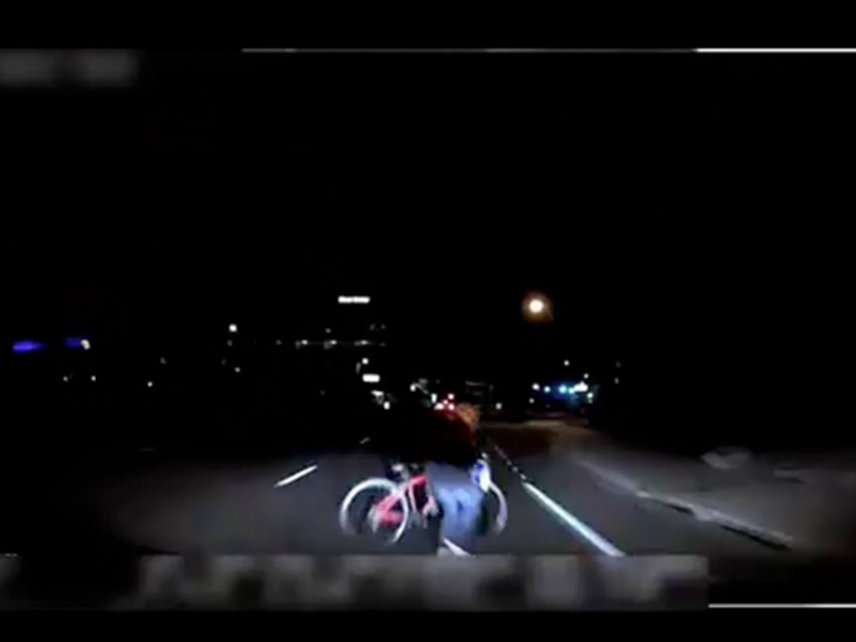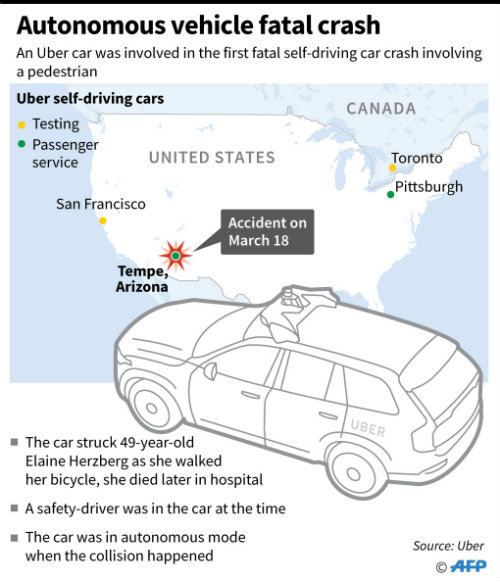Keep Testing Self-Driving Cars, Even If They Kill People
Self-driving cars are likely to save lives. One tragic, accidental death should not stop that from happening. Keep testing.

If March 18 was a typical day on America's roadways, about 90 people lost their lives in car accidents during that 24-hour span.
Unless you were unfortunate enough to know one of them, you probably didn't hear about the vast majority of those crashes. But you've probably heard about the accident that killed Elaine Hertzberg, a 49-year-old Arizona woman who was struck and killed by an autonomous Uber vehicle undergoing testing in Tempe. Video of the incident released by police shows that Hertzberg was crossing the street outside of designated crosswalks, and that neither the self-driving car nor the human back-up driver stationed in it had time to detect Herzberg before the collision took place. Police determined that the pedestrian was at fault.
It was an unfortunate accident, the kind that unfortunately happens every day on roads all over America. The fact that the vehicle was a self-driving car has made the accident a national news story, but policy makers should try not to overreact. Self-driving cars have an incredible potential to save lives, and officials should not put that prospect at risk.
Already, Arizona Gov. Doug Ducey, a Republican, has suspended Uber's self-driving car testing privileges in his state, citing concerns about public safety. That move is a "a major step back from his embrace of self-driving vehicles," notes Melissa Daniels of the Associated Press. Ducey had previously welcomed autonomous driving tests to the state after they were subjected to strict regulation in California.
Meanwhile, four state senators introduced a bill this week to ban autonomous vehicles from being tested in Minnesota. "Arizona confirmed my concerns," state Sen. Jim Abeler (R-Anoka) told Minnesota Public Radio. "I've been hearing about this and am very worried about it. And very frankly the idea of driving home while you ride in the back seat is just a recipe for trouble."

Want to hear an even bigger recipe for trouble? Driving home while he rides in the driver's seat.
To err is human, and human error is the cause of 90 percent of car crashes. "We should be concerned about automated vehicles," University of South Carolina law professor Bryant Walker Smith told the Associated Press in 2016. "But we should be terrified about today's drivers."
If driverless cars can amass a better safety record than that, they will literally save lives. Unfortunately, those futures lives saved are invisible relative to lives lost in the present, which have significantly more weight for governors, legislators, and regulators.
In aggregate, car accidents are a massive public health problem. And I don't just mean the deaths they case. Americans spend $230 billion annually to cover the costs of accidents, accounting for approximately 2 to 3 percent of the country's GDP.
Driverless cars will not be perfect. Certainly, they won't be perfect when human beings are darting out into traffic on dimly lit streets where there's no crosswalk, as Hertzberg apparently did. But we shouldn't expect perfection. If they can be better than human drivers—and that's a low bar—then they should continue to be tested and developed. They will only get better.
And even if you're skeptical of the assumption that computers can drive better than human beings, the only way to find out for sure is to allow more testing. As Megan McArdle of The Washington Post points out, Americans drove 3.2 trillion miles in 2016, with a 1.18 fatalities for every 100 million miles driven. How far have driverless cars driven since they began being tested? Fewer than 100 million miles. It sounds like a lot, but it's a very small sample size. To get a better perspective, we need a bigger sample.
Prior to the accident earlier this month, Arizonans seemed willing to give autonomous vehicles that chance. A February poll sponsored by the Consumer Choice Center found that 51 percent of Arizonans favored testing self-driving cars in the state, while 42 percent were opposed. Residents aged 18 to 44 were far more likely to support self-driving cars than older residents were.
Those feelings may shift in the wake of Hertzberg's death, but officials should keep the long-term perspective in mind.
As Reason's Ron Bailey wrote in a prescient July 2016 article, driverless cars have the power to make us richer, less stressed, more independent, and safer. "Unless," he added, "lawmakers and regulators manage to screw everything up."

Show Comments (350)